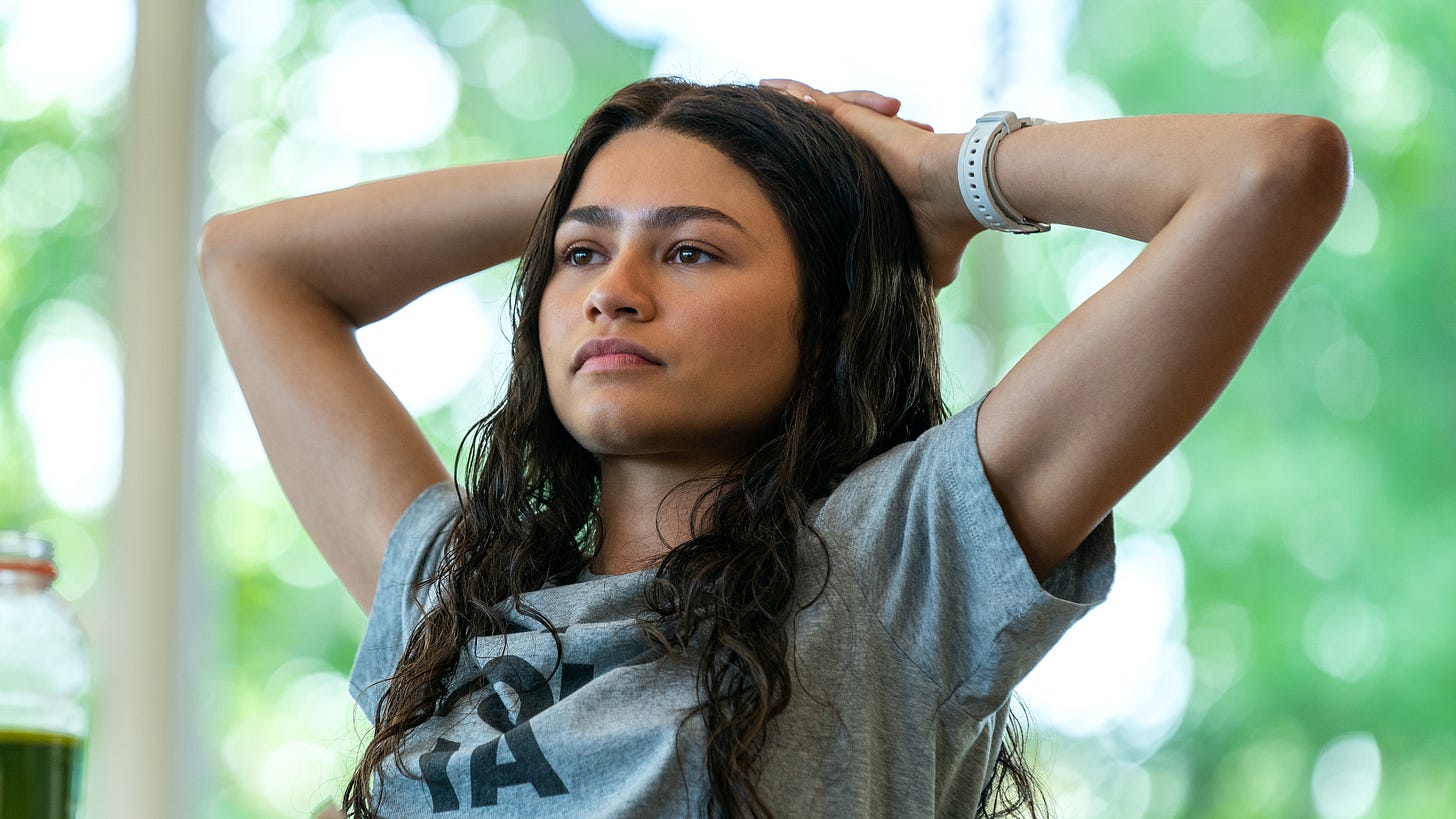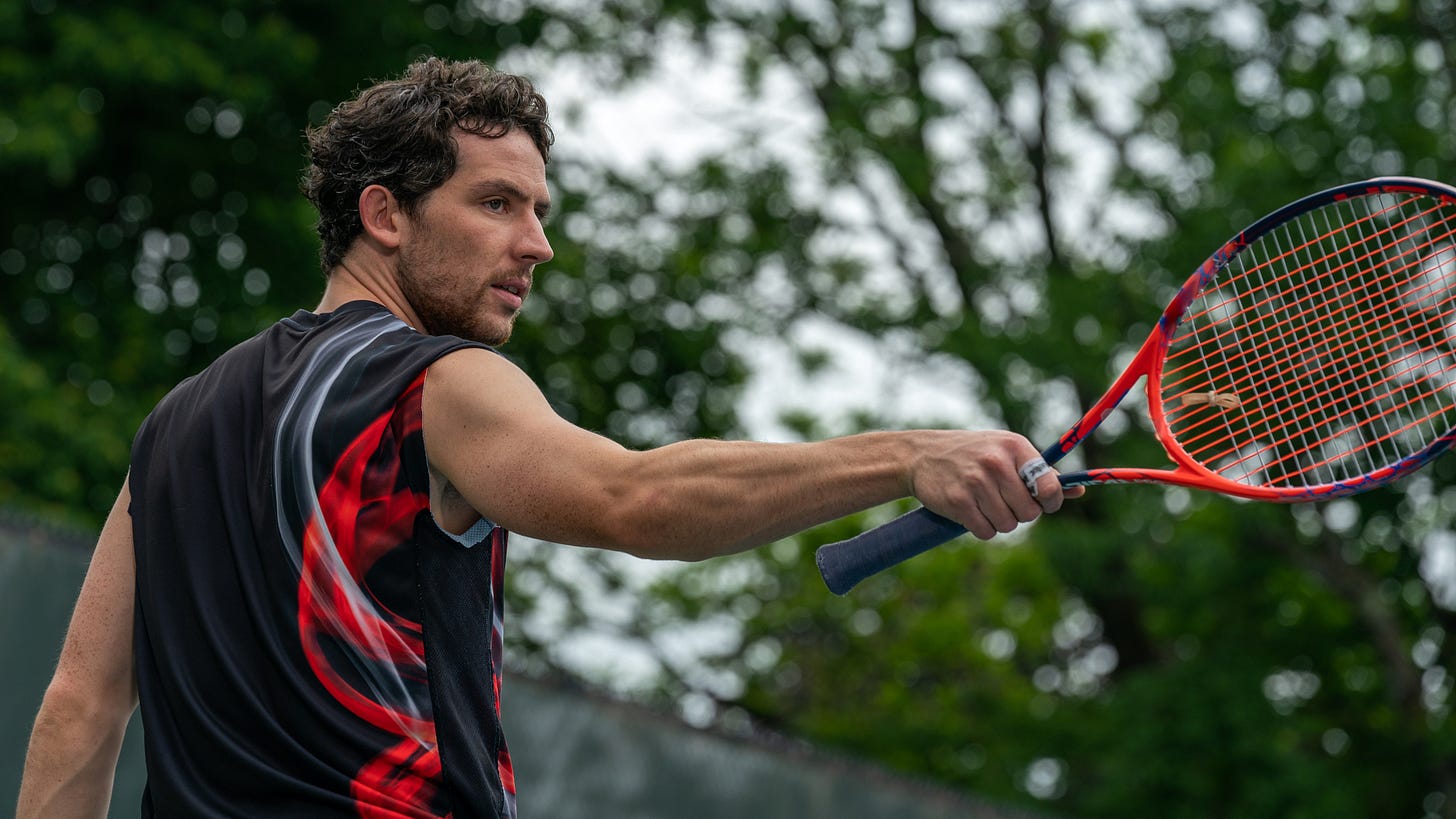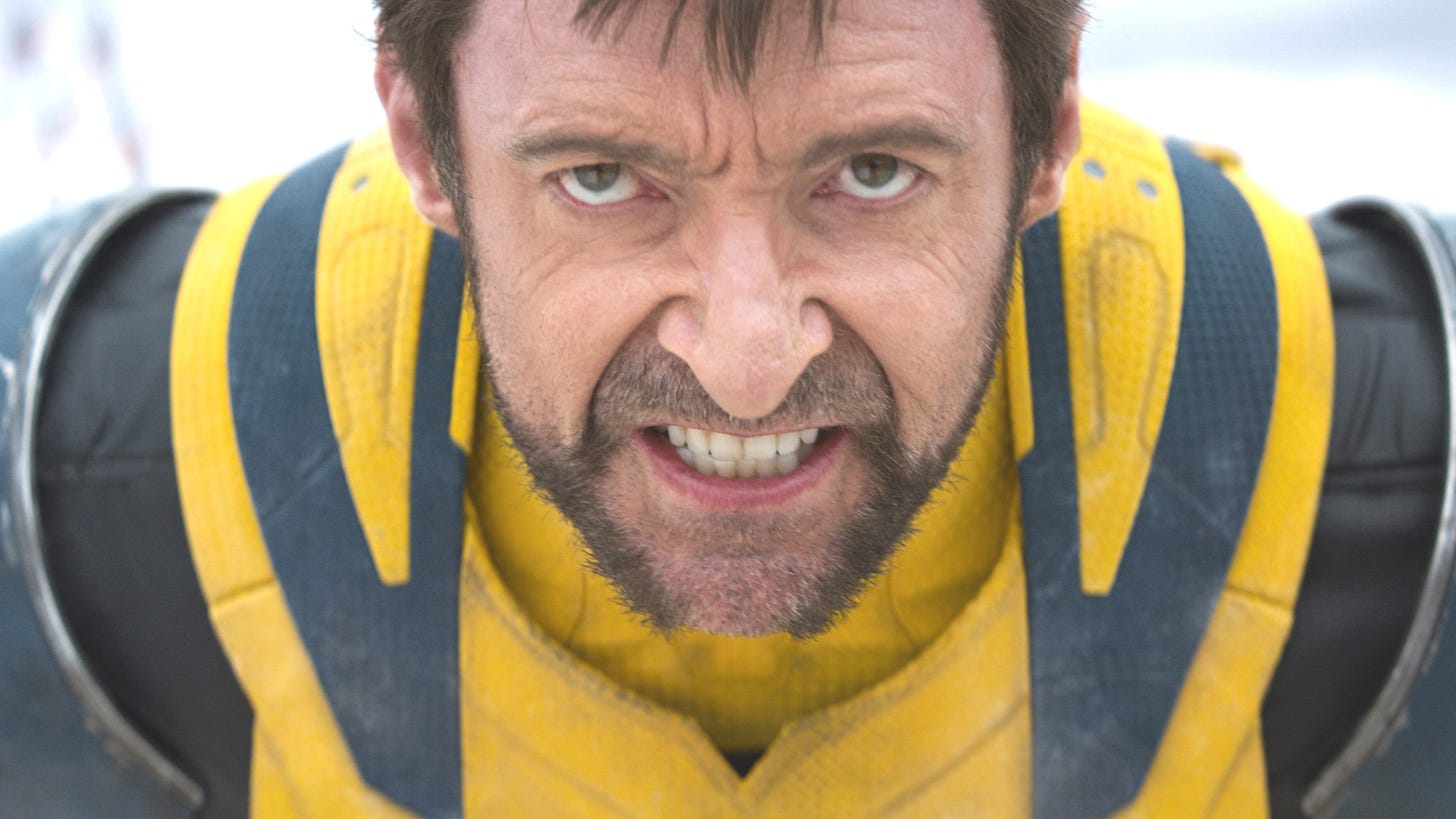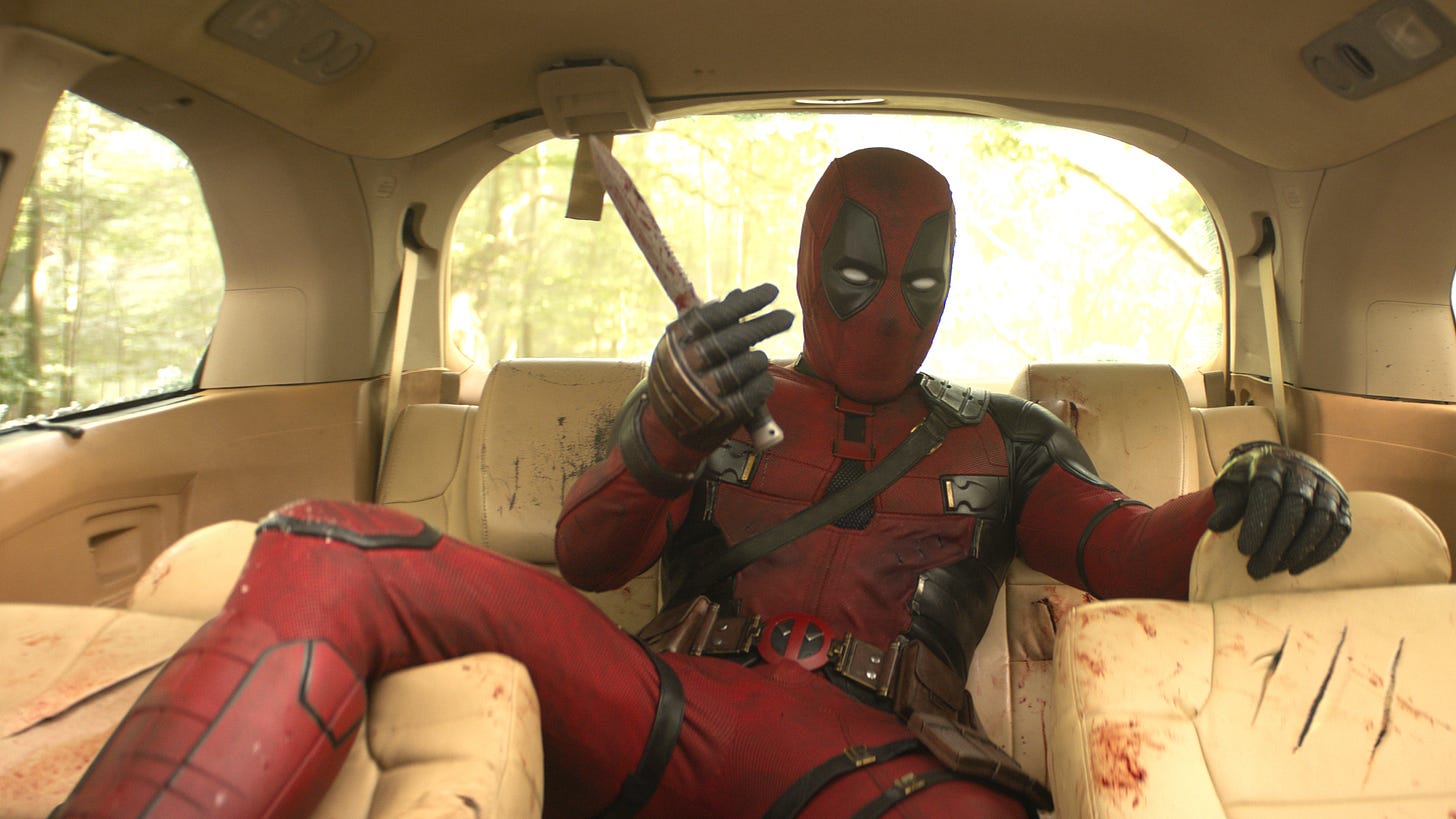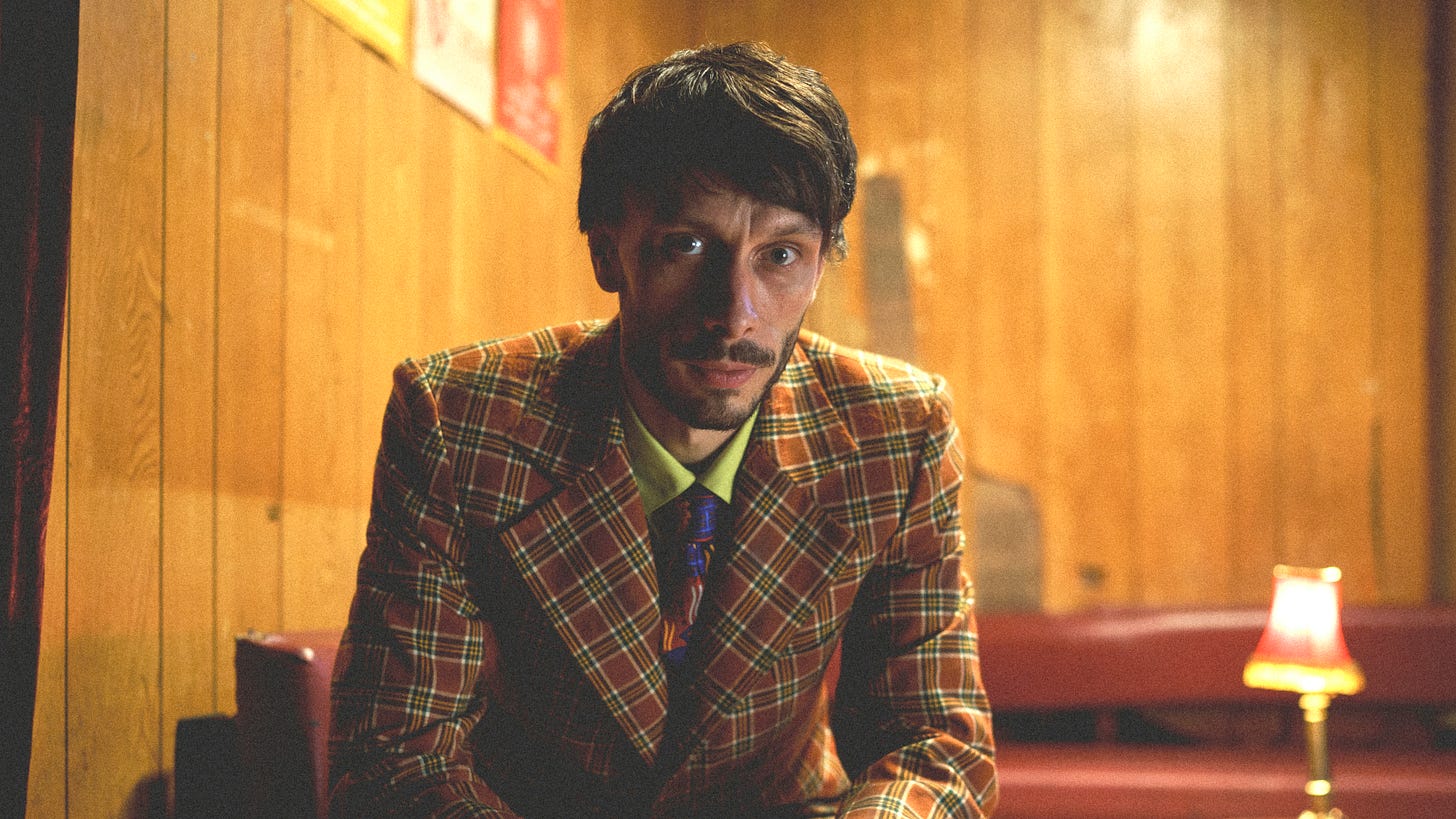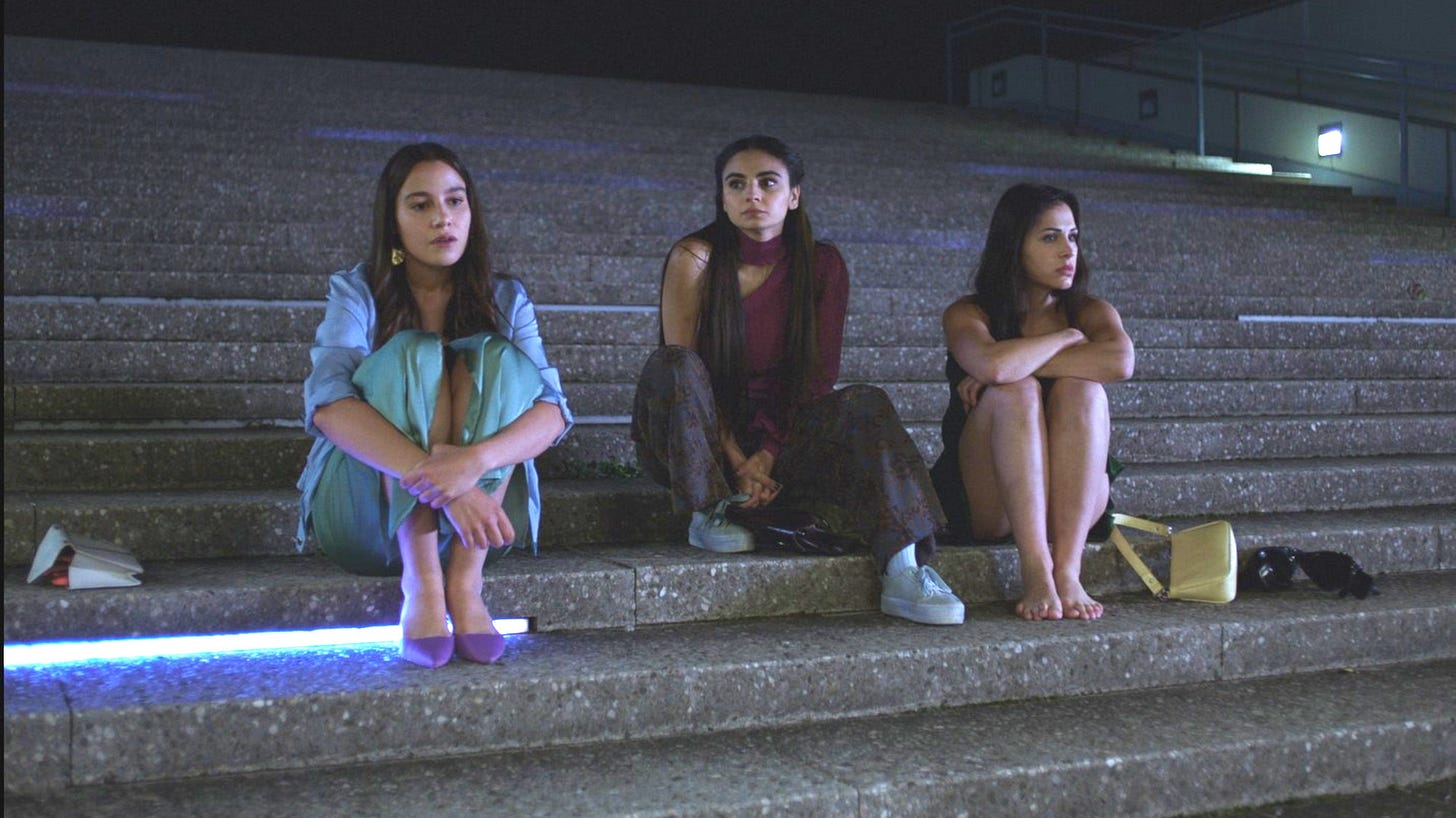We need more than sweary Hugh Jackman to save the MCU
The Deadpool & Wolverine trailer has me worried, while Baby Reindeer just had me uncomfortable. And yes, we're also talking about the Zendaya tennis threesome movie. I'm not a monster.
Zendaya has served an ace with Challengers
“This game is about winning the points that matter.”
When seasoned tennis pro Art Donaldson (Mike Faist) says those words to his former friend — washed-up journeyman player Patrick Zweig (Josh O’Connor) — he says them with confidence. But by this point in Luca Guadagnino’s sublimely slippery relationship drama Challengers, we already know Art’s problem. He hasn’t got a clue which points matter any more.
The source of this fog is Art’s wife Tashi (Zendaya). All three first met on the junior tour in the 2000s, where a sweaty night in a hotel room — not the event the film’s marketing has implied — established Tashi’s position. She believes truly great tennis is a relationship and, as the years go by, she’s romantically entangled with both of her “little white boys”. But actually, she’s far more interested in them on the court than in her bed.
That’s right; Challengers is not an erotic drama with tennis in it. It’s very much a tennis movie. The drama pivots, orbits, and quivers ominously around a centrepiece match — Art and Patrick meeting for the first time since turning professional, in the final of a low-key tournament. Art has entered as a wildcard to build confidence ahead of the US Open. For Patrick, these unglamorous events are his bread and butter.
In the same way that Whiplash imagined drumming greatness as a power struggle between Miles Teller’s neophyte stickman and JK Simmons’ ogre-like teacher, Challengers is as much about power dynamics as it is about sport, sex, or the intermingling of the two. Zendaya’s beautifully inscrutable performance is the conduit for all of this. Tashi loves tennis more than she loves either of the two men in her life and Zendaya has great fun weaponising her own megawatt charisma to beguiles the audience as much as Tashi bedazzles the two sweaty men between whom she sits in the first act’s murky bedroom.
And Guadagnino certainly isn’t afraid of sweat. This is a film about desire and its physicality, as shown clearly in a sauna face-off between Art and Patrick. Art sits on the highest tier, befitting his status as the apparent winner of the game of life. But his stiff posture, towel tightly around his waist, reveals his insecurity. By contrast, Patrick is happy to relax on the lower level, towel lazily covering his crotch, and shit-eating grin across his face.
Guadagnino has always been a visual, sensual filmmaker, but he’s helped in Challengers by a truly terrific script courtesy of Justin Kuritzkes. Its nesting, fragmented flashbacks are a feat of structure and pacing, catapulting us through the complexities and nuances of the trio’s history without ever surrendering the intensity of their feelings — punctuated by the propulsive clubland synths of Trent Reznor and Atticus Ross’s insistent, claustrophobic score.
For two hours, Challengers moves with an inescapable and irresistible rhythm. It’s a film as teasing and passionate as the characters, with the same lack of regard for personal space. When O’Connor and Faist sit mere inches from each other in an empty college canteen to mischievously share a churro, it’s like you’re pressed uncomfortably up against the plastic seats with them.
By the time the flashbacks fade and our attention turns solely to that final match, Kuritzkes and Guadagnino pull an ace from their sleeves and serve it right down our throats. It’s a 10-minute masterclass in non-verbal storytelling where the restless camera goes everywhere — pausing voyeuristically on dripping sweat and flexing muscles, watching Zendaya’s unreadable expression in the stands, or dangling off the end of swishing rackets and swerving tennis balls — in search of the truth.
It’s everything-and-the-kitchen-sink filmmaking, throwing absolutely everything at an audience by now desperate for release. The result is an ecstatic crescendo that again recalls Whiplash in its intense culmination of character, themes, and narrative. It’s breathless, beautiful filmmaking that absolutely refuses to let up until the pot boils over.
If tennis is a relationship, then Challengers is the lustful honeymoon period. When the credits roll, you just want more of it.
Challengers is in UK cinemas now.
Deadpool & Wolverine feels very, very desperate
It took 15 years for someone in the MCU to say “fuck” for the first time. It takes five seconds for someone to say it in the first trailer for Deadpool & Wolverine. There are six F-bombs in total across the trailer, averaging a fuck every 26 seconds. If it keeps that up in the full movie and we assume a two-hour running time, there will be 277 F-bombs in the film. That’s more than Pulp Fiction and only a handful fewer than in Goodfellas. It’s fair to say the MCU paradigm has shifted.
So what’s my point? Why am I watching a trailer and counting F-bombs? I certainly don’t have a problem with swearing. In fact, I happen to think it’s both big and clever. But in this case, it all just feels a bit desperate, like an eight-year-old who’s just watched their first Billy Connolly routine. Remember the second episode of Torchwood where they were so keen to show they were more adult than Doctor Who that they did a nonsensical story about a sex-addicted orgasm death alien? It’s like that. They’re just trying a bit too hard.
The reason the first two Deadpool films are so much fun is not because of all the swearing and violence. It’s because they’re genuinely sharp, witty, and have something to say about the superhero movie sausage machine. Similarly, the reason Logan is the greatest superhero movie ever — go on, fight me on that — is not because of the gore and the F-bombs. It’s a deeply melancholy journey into the heart of what heroism actually means. With claw fingers.
There’s every chance that Deadpool & Wolverine will be brilliant. Certainly, the idea of the snark and silliness of Wade Wilson butting up against the brooding machismo of Logan is the comedic polarity principle in action. And it’s understandable that the bosses at Marvel want to keep the movie’s best gags and biggest self-referential surprises out of marketing. Say what you like about She-Hulk, but that joyously dumb finale could well be the blueprint for the Merc with a Mouth’s arrival into the MCU. And it wouldn’t have hit as hard if we’d seen K.E.V.I.N. in the trailers.
But I’m a little concerned by what they’ve chosen to foreground instead when it comes to this one. Ho ho ho, this ain’t your kid’s Marvel movie. Ho ho ho, bloody dismemberments. Ho ho ho, people saying fuck. Ho ho ho, first-base cocaine jokes.
For the first time since it started, the gargantuan MCU ship is listing wildly following some lukewarm TV shows and movies that have struggled with critics, audiences, and at the box office. After a gap of well over six months between big screen outings, Deadpool & Wolverine feels like a checkpoint — firing the starting gun on the future that will lead us to Avengers: Secret Wars, and whatever we’re replacing Kang with.
So while I remain cautiously optimistic about the movie, I’m a little worried that Deadpool & Wolverine is taking the easy route — make it loud, make it sweary, and make it bloody. Instead, the prospect of having a character as fascinating as Deadpool in this world should be used to say something interesting about the Marvel machine and help to add some much-needed stakes to the Multiverse Saga,
Swearing is big and clever, absolutely. But without something more than that to hang onto, audiences will be left saying “let’s fucking go… somewhere else”.
Deadpool & Wolverine is due to hit UK cinemas on 25th July.
Baby Reindeer shows Netflix’s true power
The moment I made the decision to watch Baby Reindeer was when my wife’s grandmother brought it up over Saturday lunch. I’ve long been fascinated by the way a show or a movie can break through the arthouse bubble and into the mainstream purely by dint of floating around the top of people’s Netflix apps. And from what I knew about the show before watching it — a comedian telling the story of their own trauma — it appeared to slot directly into that category. Nobody’s grandmother would’ve heard of this show 10 years ago.
I was both right and wrong in my pre-assessment. Baby Reindeer is, in many ways, the perfect example of Netflix’s power. For those who don’t know, it follows stand-up comedian Donny (Richard Gadd) as he is increasingly menaced by the presence of Martha (Jessica Gunning), who begins stalking him after he takes pity on her at the bar where he works. On the face of it, the thing is pure true crime thriller of the sort that audiences willingly gobble up. You could’ve called it “The Reindeer Stalker” and watched the viewers roll in.
But actually, the truth of Baby Reindeer is buried deeply, beneath the stalking plot and the true crime tropes it smartly deploys. In episode four, we journey into Donny’s past and his horrific grooming and eventual rape by comedy writer Darrien (Tom Goodman-Hill). It’s one of the most unpleasant, unsettling, and brilliant half-hours of television I’ve ever seen. It’s completely raw and painful and I can’t believe Gadd had the bravery and emotional strength to do it.
Baby Reindeer is a remarkably smart exercise in tone. Its opening episodes are part-true crime and part-black comedy, amping up the unease and the danger alongside a handful of tension-puncturing bits of levity. But once the shoe drops and episode four hits, the series scratches away every last inch of surface to reveal all of the pain festering beneath. It shines a light on how unhelpful the idea of the “perfect victim” is, with Gadd’s stark honesty examining his own response to his trauma with as critical an eye as he gives to the perpetrators. If there’s any victim-blaming here, Gadd’s doing it himself.
It seems facile to praise Gadd’s performance, but the honesty rings through every frame and he resists the urge to cast himself in a better light. This show exists entirely in moral greyness and ruthlessly puts the fragility and self-destructiveness of human beings under a white-hot spotlight.
This isn’t a comfy true crime tale where you can shake your head sagely at evil or sleuth your way to an ending. Gadd and Netflix deserve praise for giving something this thorny and complex a home and enough of a marketing push to make it dinner table conversation for people who would never normally seek out this sort of story. It’s important, potent storytelling and definitely the must-see show of 2024 so far. Wonder if my wife’s grandmother ever watched it…
Baby Reindeer is available to stream on Netflix now.
The rage of innocence
The title character of Milena Aboyan’s German drama Elaha (Bayan Layla) isn’t a virgin. For most women in their early twenties, that wouldn’t be a problem. But in Elaha’s strict Kurdish community, this could be a serious hurdle to her upcoming marriage to fiancé Nasim (Armin Wahedi) and her relationship with her super-strict mother (Derya Durmaz). As a result, she begins to pursue the possibility of surgery to reconstruct her hymen before the wedding — if she can afford it.
There’s a world in which Elaha could’ve been a straightforward story about a progressive modern woman fighting back against the patriarchal control of outdated cultural values. But it’s to the credit of writer-director Aboyan — herself from a Kurdish-Armenian family — that this character’s attitude to her family’s ideas is more complicated than that. When a counsellor tells her she’s too worried about “a piece of tissue”, she shoots back: “For us, it’s not just a piece of tissue.”
Elaha is caught between her love for both her family and culture and the shame she feels about her own wants and needs. We never learn about the person she lost her virginity to and she furtively meets with a guy she used to study with and for whom her desires are complex and unclear.
Layla’s performance wears all of this complexity very well. She’s adept at putting on a brave face as myriad repressed emotions swim over her face and often unblinking eyes. This is a woman who we believe has grown up constantly having to play a role, concealing her true feelings from friends and family for fear that the community’s whisper network will brand her indecent and shame her family as a result. She’s angry at herself, her parents, her husband-to-be, and everyone around her.
Elaha isn’t an easy watch, with Aboyan’s boxy ratio keeping us trapped in a confined world, dulled into a deliberately drab kaleidoscope of greys and browns. It’s a film that never provides easy answers, exploring what it means to be a young woman with one foot in tradition and the other in modern freedoms. Well worth your time.
Elaha is in UK cinemas now. Find a screening here.
Trailer of the Week: Longlegs
It has been a long time since we got a genuinely buzzy and innovative viral marketing campaign for a movie. But the recent run of teasers for Oz Perkins’ upcoming occult horror Longlegs has told us almost nothing, while also providing chilling context clues. Nicolas Cage, who hasn’t even popped up visually in the teasers yet, gives a horrifying vocal performance in the latest clip. He and Maika Monroe star in the movie, which is out on 12th July in the USA and doesn’t yet have a UK date. I can’t wait though!
That’s it for now. As ever, please do subscribe and share the newsletter. It’s 100% free for the foreseeable future and I’m really enjoying putting it together.
Next week: Ryan Gosling falls with style in The Fall Guy and Rose Glass follows up Saint Maud with the stylish neo-noir gem Love Lies Bleeding.




